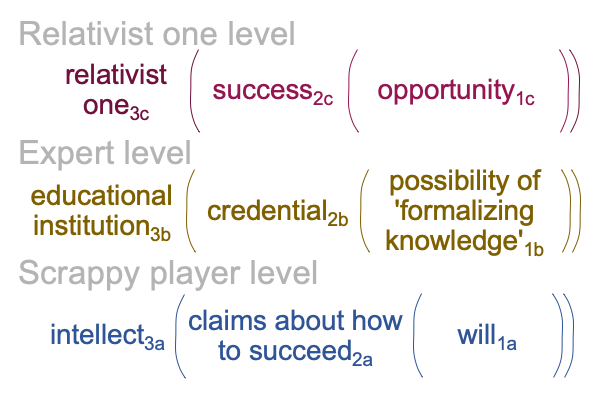0164 According to Fuller, “research ethics” is a figment of the regulatory imagination.
It is a fig leaf for the empirio-normative university.
Why?
Imagine a school, selectively taking some of the opinions and traditions of parents2a as phenomena2a, then training their children on models of price and righteousness2b that empower the one of scientism3c.
0165 In chapter ten, titled “‘Research Ethics’ as a Post-Truth Playground”, Fuller demonstrates that empirio-normative social construction does not conform to familiar codes of conduct.
Surely, many nominally Christian parents merely want their children to seal the deal of the post-truth interscope and obtain certification2b that guarantees opportunities1c for success2c in the normal context of a scientismist godhead3c. A Biblical parallel might be the ancient Hebrew family who sends their kids to the Canaanite College of Baal Business and Asherah Service Management.
0166 The problem is that there does not seem to be a clear way forward for reasonable3a,1a people, who want to learn how to get ahead and think for themselves.
Going back to the first rendition of the interscope of the relativist one, the intellects3a and the wills1a of individuals in community support diverse opinions2a that are then sifted, as phenomena2a, by an academy3b that formalizes knowledge1b.
0167 In general, the resulting formalized knowledge1b, which might include skills such as reading, writing and arithmetic, produces a person trained well-enough to find opportunity1c in the system of the relativist one3c of the day.
Here is a picture.

0168 The problem is subtle.
In this figure, “success” is an ambiguous term. On the scrappy-player level, “success2a” is “getting ahead”. On the relativist-one level, “success2c” is an actionable judgment. The godhead does not care whether the resulting actions promote or destroy human flourishing.
Yes, gods can be capricious in this way, especially gods that don’t deal with truth.
0169 So, when the scrappy player, whose will1a operates in the normal context of the intellect3a, virtually situates his will1a with the possibility of formal knowledge1b, he makes a choice to subjugate his own facts and claims2a to the facts and claims1b required to obtain a credential2b through some educational forum3b. He wants to get ahead and find opportunity1c for “success2a” from the scrappy-player point of view.
The scrappy player does not realize that he has also achieves success2c in the normal context of the relativist one3c, who sees “success2c” only as the manifestation of an actionable judgment2c, irrespective of whether that manifestation coincides with what the scrappy player regards as “success2a“.
0170 But, that does not mean that the two renderings of “success” are completely independent.
I suppose that, before the Christians establish universities throughout Europe, an astrologer may have been a success2a in regards to the relativist one3c of the time as well as a well-renumerated2a practitioner in reading celestial indicators2c. Indeed, the fact that the astrologer is well-paid2a indicates the power2c of his expertise2b within the Zeigeist3c.
As Christian universities promote the demystification of the celestial bodies2c, to the extent that Aristotle allows, the astrologer finds less opportunities1c and soon enough, no one wants to be an apprentice to the local astrologer, because that is a lousy way to get ahead2a. The relativist god of the alchemical sciences has to wait a few centuries for another post-truth civilizational moment to manifest.
0171 Oddly, this brings me back to Fuller’s tenth chapter, where he claims that ethics is usually grounded in two codes of conduct: one transactional and one transcendental.
To me, given this examination, which runs a complementary course to Fuller’s text, the transactional code may apply to institutional3b conduct in regards to the scrappy player3a and the transcendental code may apply to the divine3c in terms of the capriciousness inherent in defining success2c in terms of actionable judgments.
The transactional code says that credentials2b must be rewarded to a scrappy player2a who objectively masters the relevant formalized knowledge1b.
The transcendental code says that simply arriving at actionable judgments2c is not enough. The actions of perspective-level judgments3c ought to promote human flourishing rather than destruction.
However, as this examination continues, the adjectives “transactional” and “transcendental” are repurposed as qualifiers for capitalist and socialist values, respectively.
